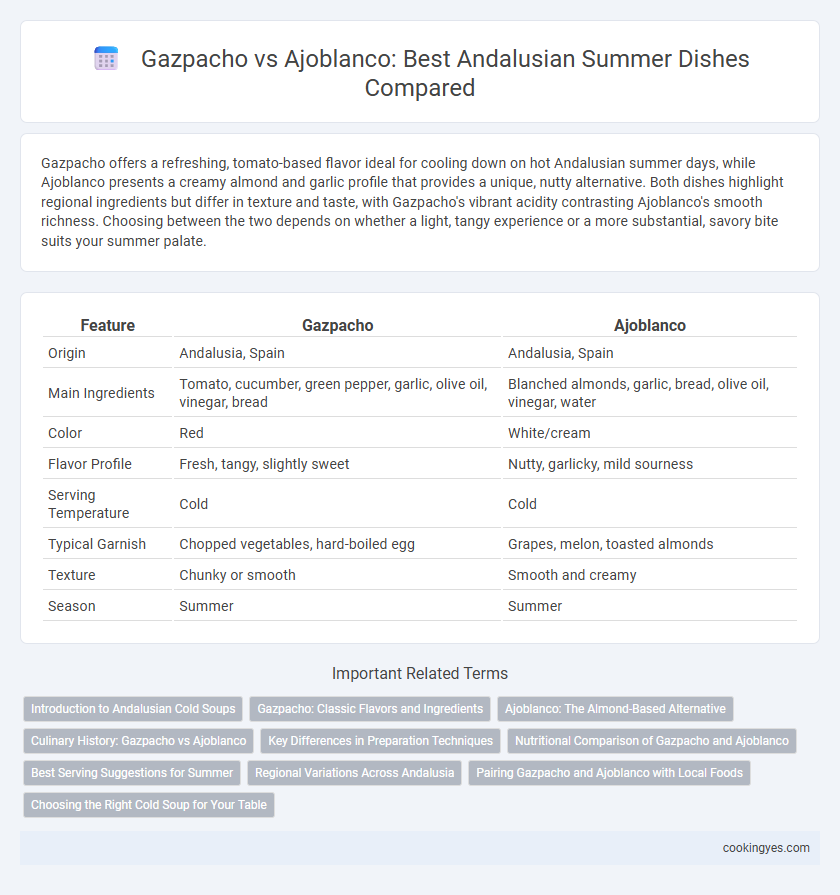Gazpacho offers a refreshing, tomato-based flavor ideal for cooling down on hot Andalusian summer days, while Ajoblanco presents a creamy almond and garlic profile that provides a unique, nutty alternative. Both dishes highlight regional ingredients but differ in texture and taste, with Gazpacho's vibrant acidity contrasting Ajoblanco's smooth richness. Choosing between the two depends on whether a light, tangy experience or a more substantial, savory bite suits your summer palate.
Table of Comparison
| Feature | Gazpacho | Ajoblanco |
|---|---|---|
| Origin | Andalusia, Spain | Andalusia, Spain |
| Main Ingredients | Tomato, cucumber, green pepper, garlic, olive oil, vinegar, bread | Blanched almonds, garlic, bread, olive oil, vinegar, water |
| Color | Red | White/cream |
| Flavor Profile | Fresh, tangy, slightly sweet | Nutty, garlicky, mild sourness |
| Serving Temperature | Cold | Cold |
| Typical Garnish | Chopped vegetables, hard-boiled egg | Grapes, melon, toasted almonds |
| Texture | Chunky or smooth | Smooth and creamy |
| Season | Summer | Summer |
Introduction to Andalusian Cold Soups
Gazpacho and Ajoblanco stand out as iconic Andalusian cold soups, each showcasing unique regional ingredients and culinary traditions. Gazpacho features a vibrant blend of tomatoes, cucumbers, peppers, and garlic, delivering refreshing acidity and bright flavors ideal for hot Andalusian summers. Ajoblanco, made from bread, almonds, garlic, and olive oil, offers a creamy texture and mild taste, providing a sophisticated alternative within Andalusian cold soup cuisine.
Gazpacho: Classic Flavors and Ingredients
Gazpacho features a vibrant blend of ripe tomatoes, cucumbers, green peppers, garlic, olive oil, vinegar, and stale bread, creating a refreshing and tangy cold soup perfect for Andalusian summers. Its rich combination of antioxidants from fresh vegetables and the smooth texture achieved by soaking bread highlights traditional Mediterranean flavors. This classic gazpacho balances acidity and freshness, making it a staple in Spanish cuisine that provides hydration and essential nutrients during hot weather.
Ajoblanco: The Almond-Based Alternative
Ajoblanco, a traditional Andalusian cold soup, stands out as the almond-based alternative to the more widely known gazpacho, offering a creamy texture derived from blended toasted almonds, garlic, stale bread, and olive oil. Its subtle, nutty flavor profile provides a refreshing and nutrient-rich option, particularly favored during the hot summer months in southern Spain. Unlike gazpacho, which primarily emphasizes tomatoes and peppers, ajoblanco's unique use of almonds enhances both the protein content and healthy fats, making it a distinctive and wholesome choice in Andalusian cuisine.
Culinary History: Gazpacho vs Ajoblanco
Originating from Andalusia, Gazpacho combines ripe tomatoes, cucumbers, and peppers, reflecting the region's agricultural abundance and Moorish influences during the Middle Ages. In contrast, Ajoblanco, an ancient cold almond and garlic soup, predates Gazpacho and showcases Roman and Mozarabic culinary roots with its nutty, garlicky flavors. Both dishes highlight Andalusian summer cuisine but differ in historical context and core ingredients, representing evolving tastes from rustic, almond-based sustenance to vibrant, vegetable-centric refreshment.
Key Differences in Preparation Techniques
Gazpacho and Ajoblanco differ significantly in their preparation techniques, with Gazpacho blending ripe tomatoes, cucumbers, peppers, garlic, olive oil, vinegar, and stale bread into a smooth, refreshing soup. Ajoblanco, however, emphasizes soaked almonds, garlic, stale bread, olive oil, and vinegar, resulting in a creamy white gazpacho variant without tomatoes. The key distinction lies in Gazpacho's use of fresh vegetables for a vibrant red color versus Ajoblanco's almond base that offers a rich, nutty flavor perfect for Andalusian summer cuisine.
Nutritional Comparison of Gazpacho and Ajoblanco
Gazpacho contains higher levels of vitamins A and C due to its tomato base, providing strong antioxidant properties and hydration essential for Andalusian summers. Ajoblanco, made primarily from almonds and garlic, offers increased protein, healthy fats, and calcium, supporting heart health and sustained energy. Both dishes deliver low-calorie, nutrient-rich options that cater to refreshing and healthful summer eating in Andalusia.
Best Serving Suggestions for Summer
Gazpacho is best served chilled with fresh, finely chopped vegetables and a drizzle of olive oil, making it a refreshing option for hot Andalusian summers. Ajoblanco, a cold almond and garlic soup, pairs perfectly with grapes or melon, providing a creamy texture and subtle sweetness to complement the heat. Both dishes benefit from a cold serving temperature and light accompaniments, enhancing their cooling effects during summer meals.
Regional Variations Across Andalusia
Gazpacho and Ajoblanco showcase distinct regional variations across Andalusia, reflecting local ingredients and climate. Gazpacho, a cold tomato-based soup, is prevalent in Seville and Cordoba, while Ajoblanco, a garlic and almond puree, is more common in Malaga and Granada, highlighting the abundance of almonds. These regional preferences illustrate the diversity of Andalusian summer dishes, emphasizing fresh, chilled ingredients ideal for the hot Mediterranean climate.
Pairing Gazpacho and Ajoblanco with Local Foods
Gazpacho pairs perfectly with fresh local tomatoes, cucumbers, and bell peppers, enhancing the vibrant flavors of Andalusian summer produce, while Ajoblanco complements toasted almonds, grapes, and Iberian ham, creating a contrast of cool creaminess and savory depth. Both dishes highlight the rich agricultural heritage of Andalusia and are best enjoyed with crusty rustic bread or olives from the region. These pairings not only celebrate seasonal ingredients but also bring authentic Andalusian culinary traditions to the table for a refreshing summer feast.
Choosing the Right Cold Soup for Your Table
Gazpacho and Ajoblanco are two iconic Andalusian cold soups, each offering distinct flavors and textures ideal for summer dining. Gazpacho features ripe tomatoes, cucumbers, peppers, and garlic blended into a refreshing, tangy base rich in antioxidants and vitamins. Ajoblanco, made with almonds, garlic, bread, and olive oil, provides a creamy, nutty alternative packed with healthy fats and protein, perfect for those seeking a milder, more substantial chilled dish.
Gazpacho vs Ajoblanco for Andalusian summer dishes Infographic

 cookingyes.com
cookingyes.com